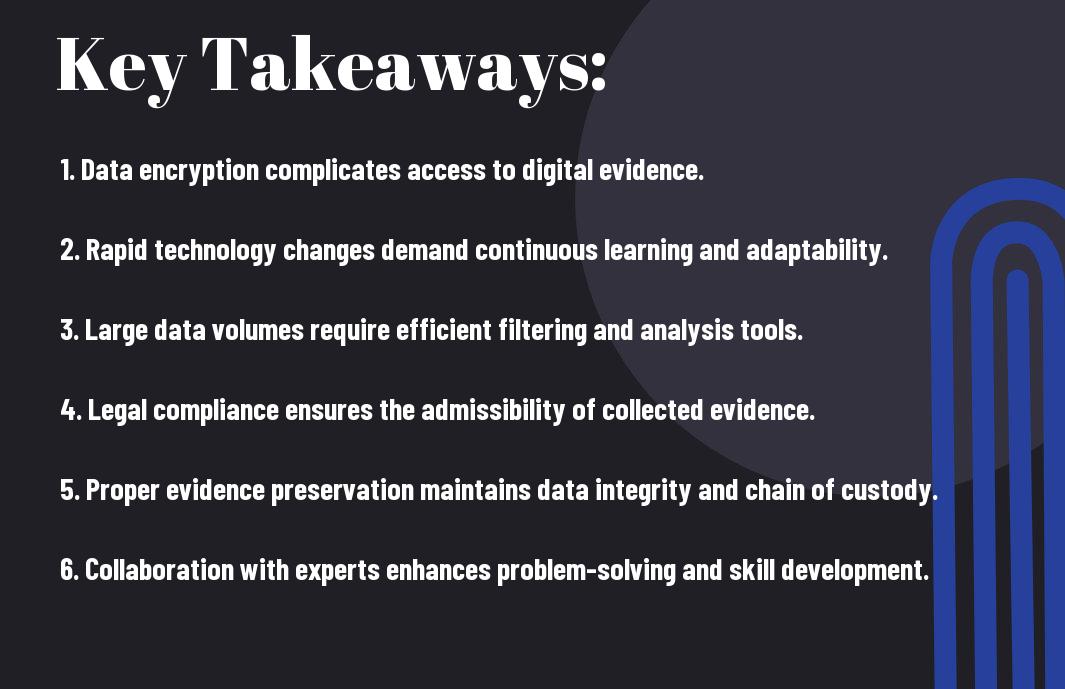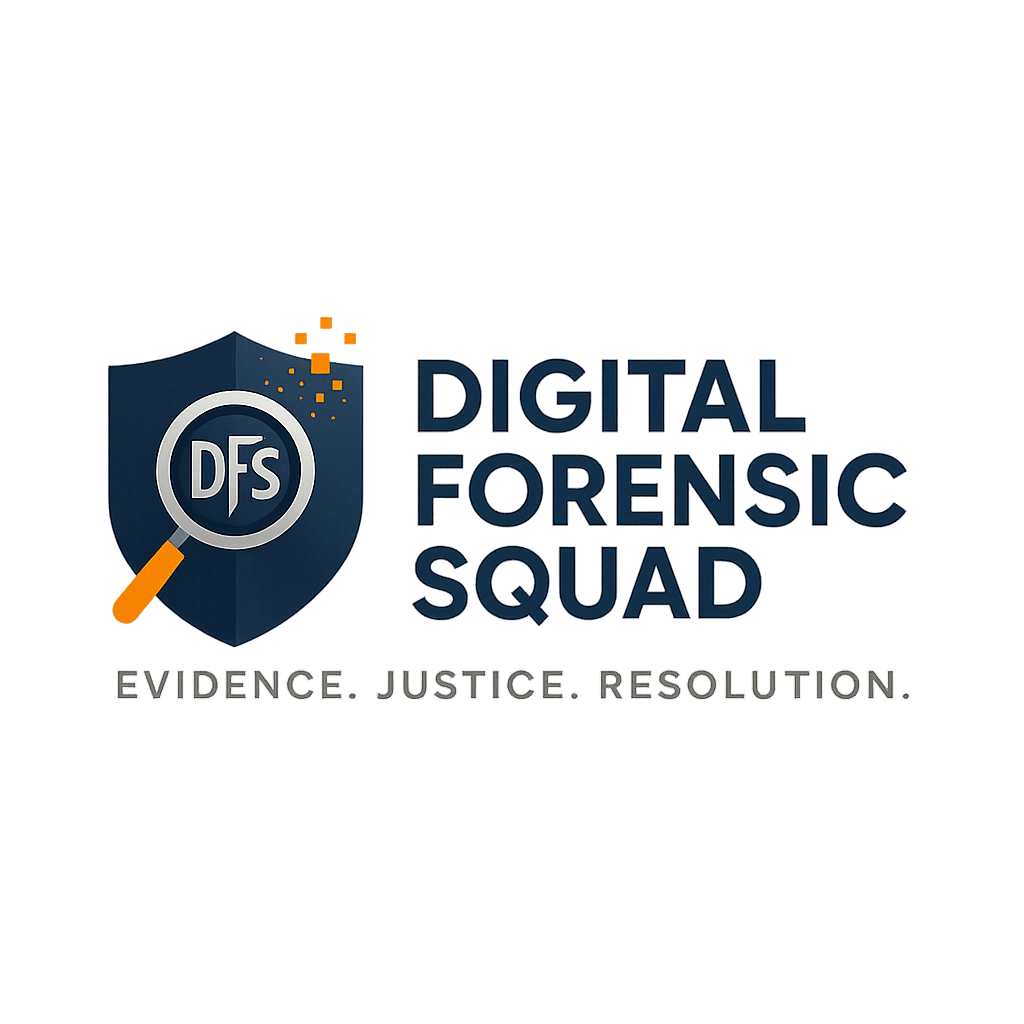With the rapid evolution of technology, digital forensics presents a range of complex challenges that can feel overwhelming for beginners. You may encounter issues like data corruption, encryption, and an ever-growing variety of devices and platforms. However, by leveraging established best practices and seeking out the right tools, you can effectively navigate these obstacles. In this blog post, we’ll explore common hurdles you might face in digital forensics and equip you with strategies to enhance your skills and confidence in this vital field. Visit Digital Forensic Squad to learn more about applications of digital forensics.
Key Takeaways:
- Understanding the legal and ethical frameworks is crucial for digital forensics; beginners should familiarize themselves with relevant laws and guidelines to ensure compliance and avoid pitfalls.
- Mastering the use of various forensic tools and techniques can be overwhelming; newcomers can benefit from online courses, workshops, and hands-on practice to build their skills gradually.
- Maintaining detailed documentation throughout the investigation process is vital; beginners should develop a systematic approach to capturing and organizing findings to support the integrity of their analyses.
Understanding Digital Forensics
While delving into the field of digital forensics, it’s important to grasp its fundamental principles and practices. Digital forensics encompasses the meticulous process of collecting, analyzing, and preserving data from electronic devices for legal investigations. This discipline not only helps in unraveling cyber crimes but also aids organizations in understanding their vulnerabilities and mitigating future risks.
Definition and Scope
Understanding digital forensics involves recognizing its foundational aspects, which include the extraction and examination of digital evidence. Its scope spans various devices, such as computers, smartphones, and networks, ensuring that any digital footprint related to a crime can be identified and analyzed. By grasping these components, you lay the groundwork for a successful forensics career.
Importance in Modern Investigations
Definition of digital forensics in today’s world is pivotal for effective investigations. You can appreciate the significance of this field as it provides law enforcement and organizations tools to investigate cyber crimes, resolve disputes, and enhance security protocols. The increasing prevalence of digital evidence ensures that a strong grasp of digital forensics is invaluable for legal professionals and tech experts alike.
Understanding why digital forensics is a fundamental component of modern investigations is vital for you. In a world where cyber threats are becoming increasingly sophisticated, the ability to retrieve, analyze, and present digital evidence can significantly impact the outcome of legal cases. Moreover, digital forensics plays a pivotal role in corporate settings by helping organizations manage and respond to data breaches, thus preserving their reputation and financial stability. By embracing these aspects, you position yourself as a knowledgeable player in the field of digital forensics.

Common Challenges in Digital Forensics
Clearly, digital forensics presents unique challenges that can be daunting for beginners. You may face issues related to technology, data management, and legal considerations. Understanding these hurdles is important for anyone venturing into this field. For an introduction to digital forensics and its benefits, you can refer to What Is Digital Forensics? (With Advantages and …).
Data Volume and Variety
Forensics involves managing massive amounts of data and different formats. As a beginner, you need to develop skills for handling various data types and ensure no vital evidence is overlooked. Familiarizing yourself with data assessment tools can ease this learning curve.
Encryption and Security Measures
Between evolving security measures and encryption technologies, retrieving data can be quite challenging. As a beginner, understanding these complexities will enable you to adapt your methods effectively.
Security is a double-edged sword in digital forensics. Encryption protects sensitive information but poses significant obstacles when you attempt to access or analyze data. In the face of strong encryption, you may encounter situations where digital evidence appears inaccessible. It’s important to stay informed about the latest decryption techniques and always prioritize ethical practices to maintain credibility in your investigations.
Technical Limitations in Tools and Techniques
After delving into the intricacies of digital forensics, you may encounter an array of technical limitations inherent in the tools and techniques available. These constraints can hinder your ability to effectively analyze data, leading to incomplete investigations. Understanding these limitations allows you to seek better alternatives or supplemental methods to enhance your forensic capabilities.
Software and Hardware Constraints
Along your forensic journey, you will often face software and hardware constraints that can impede your analysis. Many tools require specific operating systems or hardware specifications to function effectively, potentially leading to compatibility issues. Ensuring your setup meets these requirements will help you maximize the tools at your disposal.
Evolving Technology and Cyber Threats
Limitations arise as digital advancements and cyber threats rapidly evolve, often outpacing forensic tools. New encryption methods and sophisticated malware can render your current techniques ineffective. Staying aware of the latest trends and continuously updating your skill set is crucial to combating these challenges.
Plus, as you navigate the world of digital forensics, understand that evolving technology brings both challenges and opportunities. The introduction of advanced encryption algorithms and emerging cyber threats can obscure data, making analysis complicated. However, by staying informed about these developments and investing in ongoing education, you can adapt to changes effectively and enhance your forensic approaches, ultimately ensuring that you remain competent in an ever-changing landscape.
Legal and Ethical Considerations
Many newcomers to digital forensics struggle with navigating legal and ethical boundaries. Understanding the laws governing data access and privacy is necessary to ensure that your investigations are legitimate and do not infringe on individuals’ rights. As you probe into this field, you must familiarize yourself with local, national, and international regulations to conduct your work responsibly and ethically.
Privacy Issues and Compliance
Among the primary concerns in digital forensics are privacy issues and compliance with data protection laws. You need to ensure that the methods you use to gather and analyze digital evidence comply with regulations like GDPR or HIPAA. Familiarizing yourself with these laws will help safeguard individuals’ rights and maintain the integrity of your forensic process.
Chain of Custody and Evidence Integrity
Around the world of digital forensics, you must pay close attention to the chain of custody and the integrity of evidence. These elements are vital in ensuring that the data you collect remains admissible in legal proceedings. Each step of your investigation should be meticulously documented to establish a clear path from evidence collection to presentation in court.
And establishing an unbroken chain of custody is paramount for maintaining the integrity of your evidence. This means documenting who collected, handled, and analyzed the evidence while ensuring that it is securely stored. Any break or inconsistency in this chain can lead to challenges against the admissibility of your findings, which could undermine your entire case. Use proper procedures and technology, such as digital signatures, to reinforce this chain and bolster your credibility in both legal and professional contexts.

Building a Foundation as a Beginner
Now is the perfect time to lay a solid foundation in digital forensics. As a beginner, you’ll want to familiarize yourself with the basic principles, tools, and practices that govern this field. Start with understanding concepts such as evidence preservation, data acquisition, and analysis techniques. By immersing yourself in both theoretical knowledge and practical experience, you can build the skills necessary to excel in digital forensics and navigate the challenges that lie ahead.
Essential Skills and Knowledge Areas
Beside technical proficiency, you should focus on developing a strong understanding of legal aspects, investigative procedures, and the lifecycle of digital evidence. Building your analytical and problem-solving skills is also important, as these will help you effectively interpret data and draw meaningful conclusions. Additionally, communication skills are vital for presenting your findings to both technical and non-technical audiences.
Recommended Resources and Training
Training in digital forensics can significantly enhance your capabilities and confidence. Look for courses that cover digital evidence management, forensic tools, and legal considerations related to digital investigations. Joining online forums, attending workshops, and obtaining certifications in relevant areas will not only expand your knowledge but also connect you with other professionals eager to share their expertise.
Indeed, the right resources and training can set the stage for your success as you commence on your digital forensics journey. Explore reputable platforms such as Coursera, Udemy, and specialized institutions that offer comprehensive courses. Participating in community events and conferences can expose you to the latest trends and techniques in the field. Moreover, obtaining certifications like Certified Computer Forensics Examiner (CCFE) or Certified Ethical Hacker (CEH) can bolster your resume. By actively engaging with these resources, you’ll equip yourself with critical insights and skills that will help you overcome common challenges in this domain.
Strategies to Overcome Challenges
Once again, approaching digital forensics with a proactive mindset can help you navigate the common hurdles effectively. Exploring 5 common challenges with digital investigations—and how … to tackle them is a great starting point. By diversifying your skill set, utilizing appropriate tools, and staying updated with ongoing training, you can enhance your investigative effectiveness and counteract these challenges efficiently.
Best Practices in Digital Forensics
To ensure success in digital forensics, adhering to established best practices is vital. Always maintain a clear chain of custody, document procedures thoroughly, and conduct comprehensive analyses while using certified tools. By integrating these practices into your workflow, you’ll strengthen the integrity of your investigations and build trust with stakeholders.
Utilizing Community and Professional Networks
Before venturing into the complexities of digital forensics, take advantage of community and professional networks. Engaging with other professionals can offer valuable insights, resources, and support.
A strong network can provide you with access to expert advice, collaborative opportunities, and current industry trends. By participating in online forums, attending conferences, and joining associations, you can connect with experienced individuals who are willing to share their knowledge. This not only enhances your understanding of digital forensics but also opens up new avenues for collaboration, making your investigations more efficient and effective.
Summing Up
As a reminder, entering the field of digital forensics comes with its set of challenges, such as rapidly evolving technology and complex investigative procedures. To effectively navigate these hurdles, you should invest in continuous education, seek mentorship, and engage in hands-on practice. Building a solid understanding of the legal implications and technical skills will empower you to face obstacles confidently. By implementing proactive strategies and leveraging available resources, you’ll strengthen your capabilities and enhance your expertise in the digital forensics landscape.
FAQ
Q: How can beginners stay updated on the latest tools and techniques in digital forensics?
A: To remain current in the field of digital forensics, beginners should engage in continuous learning. This can be achieved through a combination of online courses, webinars, and attending industry conferences. Joining professional organizations and forums dedicated to digital forensics can also provide access to valuable resources, networking opportunities, and insights from experienced practitioners. Regularly visit Digital Forensic Squad to learn more about another effective way to stay informed about emerging trends and tools.
Q: What practical steps can beginners take to gain hands-on experience in digital forensics?
A: Beginners can gain practical experience by setting up a home lab where they can practice using forensic tools and techniques in a controlled environment. They can download open-source forensic software, participate in capture-the-flag (CTF) competitions, and work on simulated scenarios that mimic real-life investigations. Additionally, volunteering for projects or internships with organizations involved in digital forensics can provide valuable exposure, mentorship, and guidance from professionals in the field.


